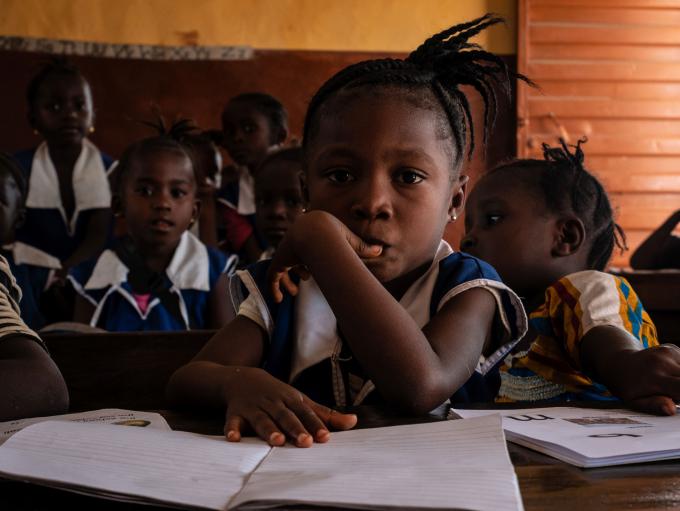Save the Children and MBSSE Launch Back to School Sierra Leone Brief

Safe learning in COVID-19 response and recovery is the right of every child in Sierra Leone
Freetown, June 9, 2021
Following school closures on March 19th 2020, in order to reduce the spread of the virus, over 2 million children had their learning disrupted for a period of seven months. The onset of COVID-19 highlighted challenges for education in terms of enrolment, quality and inclusion.
According to the World Bank, 82% of children completed primary school in 2019 and 72 % completed senior secondary school.[1] Additionally, just 12 percent of children age 7-14 years have functional numeracy skills and 16 percent functional literacy skills.[2]
Being at home also meant that many children, especially girls, had to help out with domestic chores, and were unable to focus on their studies. These children are at risk of lagging far behind their peers if they do return to school, or if they do not return at all.
In a recent interview with a girl in Kailahun by Save the Children on the impact of COVID-19 on education, she talked about the impact and changes since schools reopened in October:
“Five of my friends did not return to school because they got pregnant.”
During school closure, the Ministry of Basic and Secondary School Education [MBSSE], promptly created an Education Emergency Taskforce to coordinate the response through working groups for communication, distance learning, school reopening and readiness and; policy operations and planning.[3] The response plan included provision of distance learning programmes through print materials, radio, TV and online teaching.
Despite the inclusive approach, some children; particularly those in hard to reach, rural poor households missed out. Girls were also more at risk of missing out because of extra chores and risk of sexual and gender-based violence (SGBV) during school closure. Even before the COVID 19 pandemic, 39% of girls were married before they turned 18 in Sierra Leone. As well as gender inequality and discrimination against girls and women, factors including adolescent pregnancy, poverty, and low levels of education drive child marriage in Sierra Leone. All of these factors are exacerbated by humanitarian crisis, including pandemics like COVID19.
To make sure that children are safe back to school, MBSSE put in place a comprehensive policy through the use of face masks, access to handwashing facilities and spacing in classrooms for social distancing.
The government placed education at the top of eight priorities in the National Development Plan 2019-2023, to accelerate learning with inclusion, thus ensuring no child is left behind. Government started the Free Quality Education initiative which guarantees free universal primary and secondary education for all school-aged children and assisted in rebuilding of the education sector.
The government of Sierra Leone is making great strides in education, and their commitment to inclusion is strong. However, there is a need to do more if we are to ensure that all children in Sierra Leone are to access free quality inclusive education and a safe and sustainable return to school. Every child in Sierra Leone must be supported to return to learning, get a sense of normalcy, and be protected.
Save the Children is asking the government of Sierra Leone to
give special attention to the most marginalised and deprived children;
ensure Education Management Information Systems (EMIS) to monitor attendance and drop-out rates of children, disaggregating data across gender, age, disability
urban versus rural locations and socio-economic status to facilitate targeted support to vulnerable groups;
keep learning alive through the strengthening of inclusive distance learning and catch up classes and;
building back better learning endorsing the GEM Declaration[4], commit to maintaining or increasing the national education budget to achieve the SDG4 (Free Primary and Secondary Education); ensuring education is central to COVID-19 recovery and stimulus plans.
Lessons can be learnt from this crisis and if the right investments are made and policies put in place, we could accelerate progress on education, particularly for the most marginalized children.
Today, June 9, 2021, the Ministry of Basic and Senior Secondary Education and Save the Children jointly announce the launch of the Safe Back to School brief on access to learning during COVID-19 response and recovery to support the National Development Plan.
Save the Children remains committed to supporting the government of Sierra Leone’s agenda in education, health and protection to fulfill our ambition for children to survive, learn and be protected.
END
Notes to editors:
Save the Children has been implementing programmes in Sierra Leone since 1999. We work in five districts; Kailahun, Pujehun and Western Area urban, rural and recently Moyamba.
Our ambition is for every child to have the right to survive, learn and be protected.
We believe their voices are important, so we promote their participation and do whatever it takes to ensure their voices are heard.
Our programmes include education, health and child protection and we use an integrated approach in our programmes combining education, protection and health to make sure we address issues affecting children comprehensively.
Save the Children has been supporting the government’s education programme through rehabilitation and school constructing in hard to reach communities in Kailahun and Pujehun. We use innovative approaches to learning such as numeracy and literacy boost; provide distance teacher training for volunteer teachers in hard to reach communities and promote inclusion for marginalised groups including child mothers and out of school over aged children.
[1]The World Bank, (2020). Sierra Leone COVID-19 Education Response, Project Information Document. https://www.google.com/url?sa=t&rct=j&q=&esrc=s&source=web&cd=&ved=2ahUKEwjmvpGgzbLvAhU6QEEAHeHzDZ0QFjAEegQIBhAD&url=http%3A%2F%2Fdocuments1.worldbank.org%2Fcurated%2Fen%2F979441606474677117%2FProject-Information-Document-Sierra-Leone-COVID-19-Education-Response-AF-P174958.docx&usg=AOvVaw2PRi2LiP6SVjQsspgf7r3p
[2] UNICEF, (2020). Supporting learning continuity during the period of COVID-19. https://www.unicef.org/sierraleone/stories/supporting-learning-continuity-during-period-covid-19
[3] UKFIET, (2020). Responding to COVID-19 in Sierra Leone: Interview with Massey Tucker and Mariana Martinez. https://www.ukfiet.org/2020/responding-to-covid-19-in-sierra-leone-interview-with-massy-tucker-and-mariana-martinez/
[4] GEM Declaration: Global Education Meeting in 2020, hosted by Government of Ghana, Norway, United Kingdom and UNESCO
 Sierra Leone
Sierra Leone